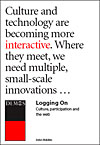UK report on culture, participation and the web
“The report looks at the convergence of three trends:
- technological change
- the way that people engage with culture
- the policy aim of increasing democratic participation in culture, with particular regard to audiences described as ‘hard to reach’.
What these trends have in common is a movement from passivity to engagement, from uni-directional flows to interactivity, and from the few to the many.
Digitisation has changed everything. It has created public expectations for on-demand, constantly available, individualised access to products. It has also challenged the assumptions of cultural sector professionals that their role is to oversee public access to culture in the sense that they act as gatekeepers to what is produced, what is shown and how it is interpreted. In the analogue world, the public was able to engage with culture on terms set by experts and professionals: content, pricing, format and timing were all decided by the producer. In a world of infinitely replicable and manipulable digital content, this no longer applies. The full implications of this for the cultural sector are not yet clear.
In the brief history of the internet, the cultural sector has followed two related paths: on the one hand, the digitisation of content and provision of information and, on the other, interactivity and opportunities for expression. Some have seen these as in binary opposition.
The truth is that they are inexorably merging. But the big question is where do we go next? How can policy intervention best meet with technology to achieve the aim of bringing about a more democratic culture? What will be the role, opportunities and limitations of online culture in a rapidly changing world?”
Download report (pdf, 719 kb, 93 pages)




